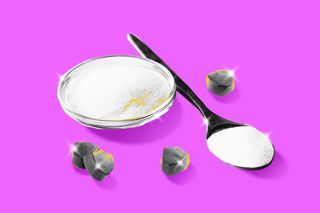
Is Collagen Truly a ‘Miracle’ Supplement or Just Another Fad?
Collagen may have certain benefits, but it’s not an elixir of life or a magic bullet against aging. Thankfully, it’s not harmful either.

Everyone — from Victoria Beckham to Jennifer Aniston to the Kardashian-Jenner gang — is swearing by collagen supplements as though it is the fountain of youth incarnate. But as Jen Thomas, a nutritionist and fitness coach from Chennai wrote, “Your body doesn’t care about advertising claims.” So its raging popularity begs the question: are collagen supplements are truly the miraculous concoctions they’re purported to be? Or is this yet another health fad, following in the footsteps of activated charcoal, sauna belts, and personalized shampoos?
What we know for sure is that collagen is a protein that is sometimes regarded as the “primary building block” that makes up our skin, muscles, bones, cartilage, ligaments, and other connective tissues. Our bodies produce it, but the production goes down as we age — with people producing 1% less collagen in the skin with every passing year after they reach the age of 20. The signs of aging — sagging skin, formation of wrinkles, and development of joint pain — are attributed to reduced collagen in the body. Enter collagen supplements — promising not only fresh, plump, and dewy skin, but also pain-free, non-creaky joints.
While collagen is healthy per se, it doesn’t necessarily mean that supplementing it from external sources will benefit us. “I tell patients that the jury is still out on taking collagen,” says dermatologist Ohara Aivaz, explaining “The issue is that most things we ingest are broken down by stomach acids and are not absorbed into the bloodstream. It’s unclear if we absorb ingested collagen or if it’s totally broken down in the stomach… We’re not actually sure if collagen supplements benefit us.” The same applies to collagen creams, too. According to her, “people are likely to get more benefit from retinol or vitamin C skin care products than from a collagen-containing cream.”
Some studies do indicate that collagen supplements are good for us: one suggests they can improve skin elasticity and hydration; another says the supplements can reduce joint pain; yet others claim they increase muscle mass and strength — besides helping wounds heal faster. If studies say so, the claims must be true, right? Well, some experts disagree.
“Some of these studies have been funded, sponsored or backed by the company behind the collagen supplement being tested, which is an obvious conflict of interest,” explains nutritionist Daniel Clarke. “Another thing to look out for is when people use a very small sample size and give their subjects questionnaires … They may look at as many as 30 different outcomes for wrinkles, for example, and if the results of one don’t work but the results of another do, they’ll just publish the successful ones — and that’s publication bias.”
Related on The Swaddle:
In fact, a 2021 study — which reviewed scientific literature on the benefits of collagen supplements and compared it to the claims made by endorsers of the supplements — concluded: “Although some studies have demonstrated that collagen supplementation can enhance skin qualities such as elasticity and hydration, dermatologic claims in the media surpass any evidence currently supported by the literature.”
Ultimately, in the words of Stephen Shumack, a clinical dermatologist, “Collagen supplements are a current fad based on little scientific evidence. Fortunately, there is little downside to taking them.” Indeed, there appears to be scientific consensus on the safety of collagen supplements, which is reassuring.
But that isn’t reason enough to take them, and having a regular, balanced diet and a healthy lifestyle is still the more logical and cheaper way to go. Bernadetta Brazzini, a dermatologist, agrees. “[Y]ou don’t need to take collagen supplements to produce collagen. Your body does this naturally using amino acids from whichever proteins you eat, so long as you’re eating a diverse diet of healthy foods, your body will be able to create the collagen it needs from those amino acids.”
And so, she says, “I recommend a more general inside-out approach for my patients… This involves regular exercise, alcohol in moderation and infrequently, a balanced diet, avoiding smoking and beginning a simple and effective topical skincare routine with dermatologist maintenance appointments to complement it.”
Related on The Swaddle:
Vaginal Odor Doesn’t Need ‘Fixing,’ Unlike What Beauty Brands Continue to Say
It might seem like a lot of work and appeals less to them than supplementing one’s diets with collagen. But choosing the right collagen supplement isn’t an easy task either; it comes with the challenge of picking the right kind of supplement. The quality and effectiveness of collagen supplements can vary widely depending on the brand and the specific type of collagen used. For starters, “Supplement manufacturers put collagen alongside other compounds so that they can patent and market their own unique formula… But as an actual protein source it’s actually a very low amount — maybe three to five grams, which is about the same as a serving of nuts,” says Clarke. While we know that we probably need more than that, we’re yet to determine the optimal dosage, adding yet another variable to this equation.
Researchers also warn that products marketed as “plant-based collagen” or “vegan collagen,” however, don’t actually contain collagen. They do claim to jumpstart the body’s collagen production, but turns out, there’s little science to back that up. Collagen supplements obtained from fish, pigs, and cattle, on the other hand, have been inked to animal abuse, illegal deforestation, and invasion of indigenous lands.
Yet, we refuse to stop — especially with beauty brands lobbying for its use, making us feel as though we’ll be missing out on youth if we don’t start consuming collagen supplements immediately. But they have an obvious motivator: money; not concerns for our wellbeing. As The New York Times noted, “[I]f you’re ingesting the recommended dose, there are no documented downsides of taking collagen peptides, aside from the not-so-frugal cost — products range anywhere from $20 (approximately, INR 1,650) to upwards of $200 (approximately, INR 16,500) for a limited supply. So, it’s your choice.”
The article added, however, that if one were inclined to join the collagen-supplement-bandwagon despite the prohibitive pricing, they must be prepared “for a very committed relationship. If collagen does work, and you’re looking for long-lasting effects, you’ll have to take supplements for the rest of your life.”
Devrupa Rakshit is an Associate Editor at The Swaddle. She is a lawyer by education, a poet by accident, a painter by shaukh, and autistic by birth. You can find her on Instagram @devruparakshit.
Related


TMI: People Tell Us What They Love About Period Sex
